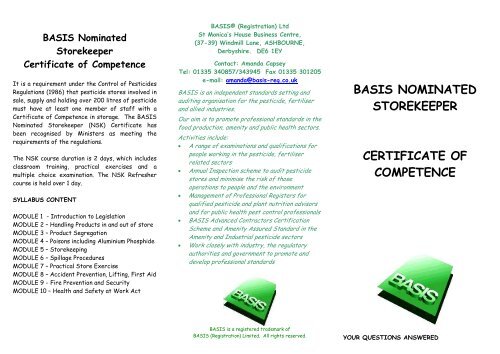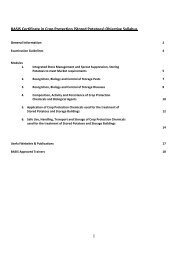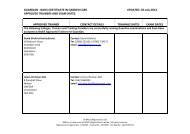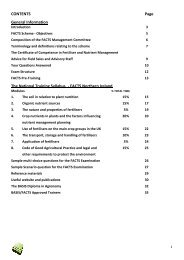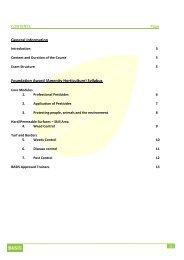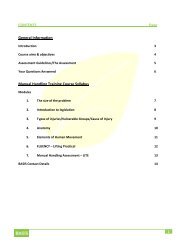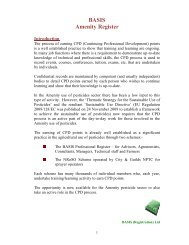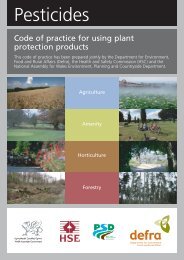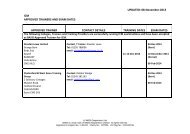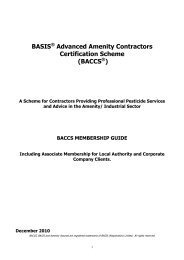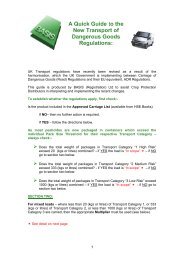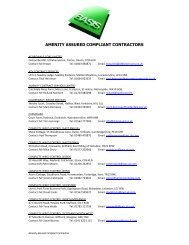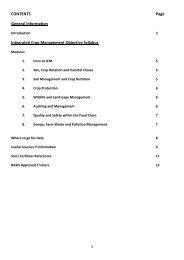basis nominated storekeeper certificate of competence
basis nominated storekeeper certificate of competence
basis nominated storekeeper certificate of competence
Create successful ePaper yourself
Turn your PDF publications into a flip-book with our unique Google optimized e-Paper software.
BASIS NominatedStorekeeperCertificate <strong>of</strong> CompetenceIt is a requirement under the Control <strong>of</strong> PesticidesRegulations (1986) that pesticide stores involved insale, supply and holding over 200 litres <strong>of</strong> pesticidemust have at least one member <strong>of</strong> staff with aCertificate <strong>of</strong> Competence in storage. The BASISNominated Storekeeper (NSK) Certificate hasbeen recognised by Ministers as meeting therequirements <strong>of</strong> the regulations.The NSK course duration is 2 days, which includesclassroom training, practical exercises and amultiple choice examination. The NSK Refreshercourse is held over 1 day.SYLLABUS CONTENTMODULE 1 - Introduction to LegislationMODULE 2 – Handling Products in and out <strong>of</strong> storeMODULE 3 – Product SegregationMODULE 4 – Poisons including Aluminium PhosphideMODULE 5 – StorekeepingMODULE 6 – Spillage ProceduresMODULE 7 – Practical Store ExerciseMODULE 8 – Accident Prevention, Lifting, First AidMODULE 9 - Fire Prevention and SecurityMODULE 10 – Health and Safety at Work ActBASIS® (Registration) LtdSt Monica’s House Business Centre,(37-39) Windmill Lane, ASHBOURNE,Derbyshire. DE6 1EYContact: Amanda CapseyTel: 01335 340857/343945 Fax 01335 301205e-mail: amanda@<strong>basis</strong>-reg.co.ukBASIS is an independent standards setting andauditing organisation for the pesticide, fertiliserand allied industries.Our aim is to promote pr<strong>of</strong>essional standards in thefood production, amenity and public health sectors.Activities include:• A range <strong>of</strong> examinations and qualifications forpeople working in the pesticide, fertiliserrelated sectors• Annual Inspection scheme to audit pesticidestores and minimise the risk <strong>of</strong> thoseoperations to people and the environment• Management <strong>of</strong> Pr<strong>of</strong>essional Registers forqualified pesticide and plant nutrition advisorsand for public health pest control pr<strong>of</strong>essionals• BASIS Advanced Contractors CertificationScheme and Amenity Assured Standard in theAmenity and Industrial pesticide sectors• Work closely with industry, the regulatoryauthorities and government to promote anddevelop pr<strong>of</strong>essional standardsBASIS NOMINATEDSTOREKEEPERCERTIFICATE OFCOMPETENCEBASIS is a registered trademark <strong>of</strong>BASIS (Registration) Limited. All rights reserved.YOUR QUESTIONS ANSWERED
How can I qualify for a Storekeeper Certificate <strong>of</strong>Competence?You can qualify by successfully attending one <strong>of</strong> the two dayBASIS training courses and passing the assessment.When and where are the courses held?They are generally held from October to March at centresthroughout the UK, according to demand. In-company coursescan be organised on request, where there are viable numbers,either for initial certification or refresher training.Are the courses practical?The courses are practically based and little writing is requiredother than in personal note taking and selecting correctstatements in the multi-choice questionnaire.What about the assessment?Your ability to understand and implement good storekeepingpractices will be assessed by the course tutor(s) and will bebased on your success in the questionnaire, your contributionduring the course and, where necessary, in the ‘one-to-one’interview afterwards.How do I apply to attend a training course?By completing and returning an application form to the BASIS<strong>of</strong>fice, see address overleaf. You will be notified when a place isavailable for you. Every effort is made to place you on a coursein your own area, although this is not always possible.Do I have to have practical experience before attending acourse?As with any training situation, the more practical experience youhave the better, as it helps you relate to the subject beingdiscussed. It is recommended that you have at least six monthsexperience in a store prior to attending the course. The courseis a valuable refresher for those with greater practicalexperience.If I pass my assessment but have limited practicalexperience, will this prevent me from gaining the <strong>certificate</strong>?No, but we are likely to recommend you continue working undersupervision until your manager is satisfied that you have gainedsufficient practical experience in handling pesticides.ID CARDSA Nominated Storekeeper ID Card is available on request, at acost <strong>of</strong> £10 (+ VAT) per card.COURSE AIMSTo equip <strong>nominated</strong> <strong>storekeeper</strong>s to meet the standards <strong>of</strong>pesticide storage laid down in the DEFRA Code <strong>of</strong> Practice forSuppliers <strong>of</strong> Pesticides to Agriculture, Horticulture andForestry by identifying:• the basic principles <strong>of</strong> good storekeeping• the accountabilities <strong>of</strong> <strong>nominated</strong> <strong>storekeeper</strong>s• the relevant points <strong>of</strong> the Food and Environment ProtectionAct (1985) and the associated Control <strong>of</strong> PesticidesRegulations (1986), and Poisons Regulations includingAluminium Phosphide.• their responsibilities under the Health and Safety at WorkAct (1974) with special reference to safe lifting, First Aidand Control <strong>of</strong> Substances Hazardous to Health (COSHH)Regulations (1999)COURSE PROGRAMMEThe sessions are organised towards the maximum involvement <strong>of</strong>candidates.Introduction Welcome and IntroductionCourse aims and conductOutline <strong>of</strong> training modules/exam guideModule 1LegislationModule 2Handling in/out <strong>of</strong>StoreModule 3ProductSegregationModule 4PoisonsLegislation applying to pesticide storage:- Food & Environment Protection Act1985- Control <strong>of</strong> Pesticides Regulations 1986- Codes <strong>of</strong> practice- Role <strong>of</strong> BASIS in the pesticide industryProcedures for handling products- receiving pesticides- dispatching pesticidesTransportation- protection <strong>of</strong> driver- safety <strong>of</strong> loadRequirements/reasons for segregation <strong>of</strong>pesticide product types/classesDefinition <strong>of</strong> a pesticideExplanation <strong>of</strong> different functions <strong>of</strong>pesticidesRequirements <strong>of</strong> the Law relating toPoisons- Poisons Act 1972- Hazards/uses/precautions <strong>of</strong> AluminiumPhosphide- Procedures for storage, sale and supply<strong>of</strong> poisonous substancesModule 5StorekeepingModule 6Spillage ProceduresModule 7Practical StoreExerciseModule 8AccidentPrevention, liftingand First AidModule 9Fire Prevention andSecurityModule 10Health and Safetyat Work ActCourse ReviewMulti-choice QuestionnaireGeneral storekeeping duties to include:Cleanliness, Orderliness and Access- to equipment/goods/doors- for emergency services- first aid/extinguishersStorage and Stacking- stability/heightsPurpose <strong>of</strong> bundingActions/equipment to deal with differenttypes <strong>of</strong> spillage and pesticide disposalVisit to store to assess standards <strong>of</strong>segregation, store fault finding andpractical exerciseReporting back and discussionSafe practices to prevent accidents- protective clothing -- lifting practices (MHOR 1992)- first aid procedures/reportingCleaning up spillages- procedure/equipmentDisposing <strong>of</strong>- waste- unwanted pesticides- empty containers- contaminated clothingSafe practices to reduce fire risksStore/Transport security measuresFire procedures and equipmentAwareness <strong>of</strong> store/safety signsAwareness <strong>of</strong>:- Health and Safety at work Act 1974- Control <strong>of</strong> Substances Hazardous toHealth Regulations 2002- Dangerous Substances Regulations 1990Review the main points <strong>of</strong> the courseRecommended course literatureFinal opportunity for discussion,questions and clarification


